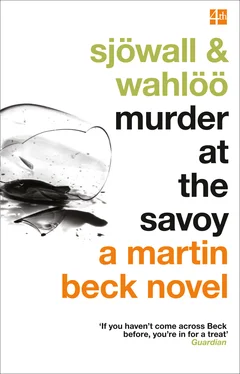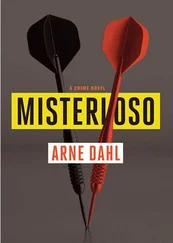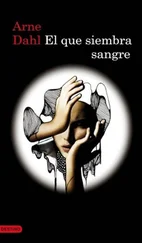Skacke departed again.
‘About the waiter. I'd say he wouldn't have noticed a thing if Dracula himself had fluttered through the dining room,’ the barman said.
Irritated, Backlund kept quiet. Månsson waited to say anything else until Skacke came back. Since Backlund was officially Skacke's superior, he carefully addressed his question to both of them.
‘Who do you two think is the best witness?’
‘A guy named Edvardsson,’ said Skacke. ‘He was sitting only three tables away. But …’
‘But what?’
‘He isn't sober.’
‘Alcohol is a curse,’ Backlund said.
‘Okay, we wait with him until tomorrow,’ said Månsson. ‘Who can drop me off at headquarters?’
‘I can,’ said Skacke.
‘I'll stay here,’ Backlund said stubbornly. ‘This is officially my case.’
‘Right,’ said Månsson. ‘We'll be seeing you.’
In the car he mumbled, ‘Trains and boats …’
‘Do you think he's got away?’ asked Skacke hesitantly.
‘He could have. Any way you look at it, we've got a whole lot of people to call. And we can't worry about waking anybody up.’
Skacke looked sideways at Månsson, who was taking out another toothpick. The car swung into the courtyard of the main police station.
‘Planes,’ Månsson said to himself. ‘It could be a rough night.’
The station seemed large, grim and very empty at this time of day. It was an impressive building. Their steps echoed desolately on the broad stone staircase.
By nature, Månsson was as slow-moving as he was tall. He detested rough nights, and besides, most of his career was behind him.
The opposite was true of Skacke. He was twenty years younger, thought about his career a lot and was eager and ambitious. But his previous experience as a policeman had made him careful, anxious to do what was expected.
So, in fact, they complemented each other quite well.
Inside his room Månsson immediately opened the window, which overlooked the station's tarmac yard. Then he sank down in his desk chair and sat silently for several minutes, reflectively spinning the platen on his old Underwood.
Finally he said, ‘Get all the radio messages and calls sent up here. Take them on your telephone.’
Skacke had a room on the other side of the corridor, across from Månsson.
‘You can leave the doors open,’ Månsson said.
And after several seconds he added with mild irony, ‘That way we'll have a real operations centre.’
Skacke went into his room and began using the telephone. After a little while Månsson followed him. He stood with a toothpick in the corner of his mouth, one shoulder propped against the doorframe.
‘Have you given this any thought, Benny?’ he said.
‘Not very much,’ said Skacke carefully. ‘It seems incredible, somehow.’
‘Incredible is the word for it,’ Månsson said.
‘What I don't get is the motive.’
‘I don't think we should give a damn about the motive until we get the details straight.’
The telephone rang. Skacke made a note.
‘The person who shot Palmgren had only one chance in a thousand of making it out of the hotel dining room afterwards. Up to the second the shot was fired, he acted like a fanatic.’
‘Something like an assassination?’
‘Right. And afterwards? What happens? Miraculously enough he escapes, and then he doesn't act like a fanatic any more, but panics.’
‘Is that why you think he's trying to leave town?’
‘Partly. He walks in and shoots and doesn't care what happens afterwards. But then, like most criminals, he panics. He simply gets frightened and only wants to get away from there, as far and as fast as possible.’
That's one theory, Skacke thought. Seems rather loosely founded, though.
But he said nothing.
‘Of course it's only a theory,’ Månsson said. ‘A good detective can't rely on theories alone. But for the time being I don't see any other line we can work on.’
The telephone rang.
Work, Månsson thought. What a way to work.
And he was supposed to have a day off!
It was a rough night in the sense that nothing really happened. Some people who more or less fitted the description were stopped on the motorways leading out of the city and at the train station. None of them seemed to have anything to do with the case, but their names were taken.
At twenty to one the last train left the station.
At quarter to two the police in Lund sent the message that Palmgren was alive.
At three o'clock another message came from the same source. Mrs Palmgren was in shock, and it was difficult to question her thoroughly. However, she had seen the gunman clearly and was sure she didn't recognize him.
‘Seems on the ball, that guy in Lund,’ said Månsson with a yawn.
Just after four the Lund police got in touch again. The team of doctors treating Palmgren had decided for the present not to operate. The bullet had penetrated behind his left ear; it was impossible to tell what damage had been caused. The condition of the patient was reported to be as good as could be expected.
Månsson's condition wasn't good. Tired, his throat very dry, he went out to the bathroom time after time to fill up on water.
‘Is it possible for someone to live with a bullet in his head?’ asked Skacke.
‘Yes,’ said Månsson, ‘it's been done before. Sometimes it's enclosed by the tissue, and the person recovers. If the doctors had tried to remove it, however, he probably would've died.’
Backlund had evidently stuck to the Savoy for a long time, for at four-thirty he called to say that he had blockaded and sealed off an area in anticipation of the technical squad's investigation of the scene of the crime, which might take place in several hours, at the earliest.
‘He wants to know if he's needed here,’ said Skacke, holding his hand over the receiver.
‘The only place he could possibly be needed is at home in bed with his wife,’ said Månsson.
Skacke conveyed the message but modified the wording somewhat. Soon after this Skacke said, ‘I think we can rule out Bulltofta. The last plane left at five after eleven. Nobody on board answered the description. The next one takes off at six-thirty. It's been booked up since the day before yesterday, and there's nobody on the waiting list.’
Månsson mulled over that for a while. ‘Hmm,’ he said finally. ‘I think I'll call somebody who isn't going to like being dragged out of bed.’
‘Who? The police chief?’
‘No, he probably hasn't slept any more than we have. By the way, where were you hiding out last night?’
‘At the cinema,’ said Skacke. ‘You can't sit at home and study every night.’
‘I've never sat at home and studied,’ said Månsson. ‘One of those hydrofoils left Malmö for Copenhagen at nine o'clock. Try to find out which one it was.’
That proved an unexpectedly difficult task, and half an hour went by before Skacke could report, ‘It's called Springeren , and right now it's in Copenhagen. It's unbelievable how grumpy some people can be when you call and get them out of bed.’
‘You can comfort yourself with the fact that I've got a much worse job now,’ said Månsson.
He went into his room, picked up the telephone, dialled Denmark, 00945, and then the home number of Police Captain Mogensen, Danish Bureau of Investigation. He counted seventeen rings before a thick voice said, ‘Mogensen.’
‘This is Per Månsson in Malmö.’
‘What the hell do you want?’ said Mogensen. ‘Do you know what time it is?’
‘Yes,’ said Månsson, ‘but this could be very important.’
‘It'd better be damned important,’ the Dane said threateningly.
‘We had an attempted murder here in Malmö last night,’ said Månsson. ‘There's a chance that the gunman flew to Copenhagen. We have a description.’
Читать дальше












